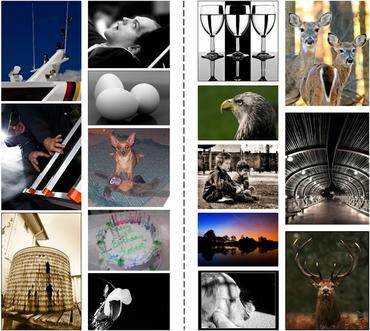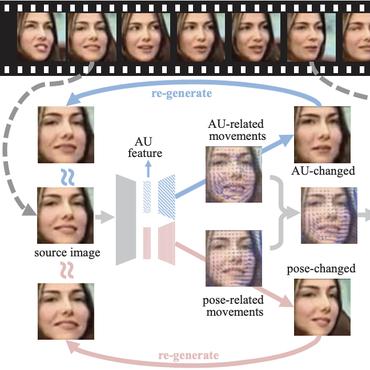Search Results for author: Bao-Gang Hu
Found 26 papers, 3 papers with code
Towards Corruption-Agnostic Robust Domain Adaptation
no code implementations • 21 Apr 2021 • Yifan Xu, Kekai Sheng, WeiMing Dong, Baoyuan Wu, Changsheng Xu, Bao-Gang Hu
However, due to unpredictable corruptions (e. g., noise and blur) in real data like web images, domain adaptation methods are increasingly required to be corruption robust on target domains.
A design of human-like robust AI machines in object identification
no code implementations • 7 Jan 2021 • Bao-Gang Hu, Wei-Ming Dong
Similar to the perspective, or design, position by Turing, we provide a solution of how to achieve HLR AI machines without constructing them and conducting real experiments.
Generalized Constraints as A New Mathematical Problem in Artificial Intelligence: A Review and Perspective
no code implementations • 12 Nov 2020 • Bao-Gang Hu, Han-Bing Qu
The new problem is called "Generalized Constraints (GCs)", and we adopt GCs as a general term to describe any type of prior information in modelings.
Revisiting Image Aesthetic Assessment via Self-Supervised Feature Learning
no code implementations • 26 Nov 2019 • Kekai Sheng, Wei-Ming Dong, Menglei Chai, Guohui Wang, Peng Zhou, Feiyue Huang, Bao-Gang Hu, Rongrong Ji, Chongyang Ma
In this paper, we revisit the problem of image aesthetic assessment from the self-supervised feature learning perspective.
Incremental Concept Learning via Online Generative Memory Recall
no code implementations • 5 Jul 2019 • Huaiyu Li, Wei-Ming Dong, Bao-Gang Hu
The main reason for catastrophic forgetting is that the past concept data is not available and neural weights are changed during incrementally learning new concepts.
 Class Incremental Learning
Class Incremental Learning
 Generative Adversarial Network
+1
Generative Adversarial Network
+1
LGM-Net: Learning to Generate Matching Networks for Few-Shot Learning
1 code implementation • 15 May 2019 • Huaiyu Li, Wei-Ming Dong, Xing Mei, Chongyang Ma, Feiyue Huang, Bao-Gang Hu
The TargetNet module is a neural network for solving a specific task and the MetaNet module aims at learning to generate functional weights for TargetNet by observing training samples.
"Ge Shu Zhi Zhi": Towards Deep Understanding about Worlds
no code implementations • 19 Dec 2018 • Bao-Gang Hu, Wei-Ming Dong
"Ge She Zhi Zhi" is a novel saying in Chinese, stated as "To investigate things from the underlying principle(s) and to acquire knowledge in the form of mathematical representations".
Gourmet Photography Dataset for Aesthetic Assessment of Food Images
1 code implementation • SIGGRAPH Asia 2018 2018 • Kekai Sheng, Wei-Ming Dong, Haibin Huang, Chongyang Ma, Bao-Gang Hu
In this study, we present the Gourmet Photography Dataset (GPD), which is the first large-scale dataset for aesthetic assessment of food photographs.
Attention-based Multi-Patch Aggregation for Image Aesthetic Assessment
1 code implementation • ACM Multimedia Conference 2018 • Kekai Sheng, Wei-Ming Dong, Chongyang Ma, Xing Mei, Feiyue Huang, Bao-Gang Hu
Aggregation structures with explicit information, such as image attributes and scene semantics, are effective and popular for intelligent systems for assessing aesthetics of visual data.
 Ranked #1 on
Aesthetics Quality Assessment
on AVA
Ranked #1 on
Aesthetics Quality Assessment
on AVA
Bilateral Ordinal Relevance Multi-Instance Regression for Facial Action Unit Intensity Estimation
no code implementations • CVPR 2018 • Yong Zhang, Rui Zhao, Wei-Ming Dong, Bao-Gang Hu, Qiang Ji
The majority of methods directly apply supervised learning techniques to AU intensity estimation while few methods exploit unlabeled samples to improve the performance.
Classifier Learning With Prior Probabilities for Facial Action Unit Recognition
no code implementations • CVPR 2018 • Yong Zhang, Wei-Ming Dong, Bao-Gang Hu, Qiang Ji
To alleviate this issue, we propose a knowledge-driven method for jointly learning multiple AU classifiers without any AU annotation by leveraging prior probabilities on AUs, including expression-independent and expression-dependent AU probabilities.
Weakly-Supervised Deep Convolutional Neural Network Learning for Facial Action Unit Intensity Estimation
no code implementations • CVPR 2018 • Yong Zhang, Wei-Ming Dong, Bao-Gang Hu, Qiang Ji
Facial action unit (AU) intensity estimation plays an important role in affective computing and human-computer interaction.
Learning with Average Top-k Loss
no code implementations • NeurIPS 2017 • Yanbo Fan, Siwei Lyu, Yiming Ying, Bao-Gang Hu
We further give a learning theory analysis of \matk learning on the classification calibration of the \atk loss and the error bounds of \atk-SVM.
Robust Localized Multi-view Subspace Clustering
no code implementations • 22 May 2017 • Yanbo Fan, Jian Liang, Ran He, Bao-Gang Hu, Siwei Lyu
In multi-view clustering, different views may have different confidence levels when learning a consensus representation.
Self-Paced Learning: an Implicit Regularization Perspective
no code implementations • 1 Jun 2016 • Yanbo Fan, Ran He, Jian Liang, Bao-Gang Hu
In this paper, we focus on the minimizer function, and study a group of new regularizer, named self-paced implicit regularizer that is deduced from robust loss function.
Locally Imposing Function for Generalized Constraint Neural Networks - A Study on Equality Constraints
no code implementations • 18 Apr 2016 • Linlin Cao, Ran He, Bao-Gang Hu
A new method called locally imposing function (LIF) is proposed to provide a local correction to the GCNN prediction function, which therefore falls within Locally Imposing Scheme (LIS).
Improving Image Restoration with Soft-Rounding
no code implementations • ICCV 2015 • Xing Mei, Honggang Qi, Bao-Gang Hu, Siwei Lyu
In this work, we describe an effective and efficient approach to incorporate the knowledge of distinct pixel values of the pristine images into the general regularized least squares restoration framework.
UniHIST: A Unified Framework for Image Restoration With Marginal Histogram Constraints
no code implementations • CVPR 2015 • Xing Mei, Wei-Ming Dong, Bao-Gang Hu, Siwei Lyu
Marginal histograms provide valuable information for various computer vision problems.
Information Theory and its Relation to Machine Learning
no code implementations • 18 Jan 2015 • Bao-Gang Hu
The paper stresses more on the first level of "What to learn?
A study on cost behaviors of binary classification measures in class-imbalanced problems
no code implementations • 26 Mar 2014 • Bao-Gang Hu, Wei-Ming Dong
Based on their cost functions, we are able to conclude that G-means of accuracy rates and BER are suitable measures because they show "proper" cost behaviors in terms of "a misclassification from a small class will cause a greater cost than that from a large class".
Unsupervised Ranking of Multi-Attribute Objects Based on Principal Curves
no code implementations • 19 Feb 2014 • Chun-Guo Li, Xing Mei, Bao-Gang Hu
In this work, we focus on unsupervised ranking from multi-attribute data which is also common in evaluation tasks.
A New Strategy of Cost-Free Learning in the Class Imbalance Problem
no code implementations • 22 Jul 2013 • Xiaowan Zhang, Bao-Gang Hu
Another advantage of the strategy is its ability of deriving optimal rejection thresholds for abstaining classifications and the "equivalent" costs in binary classifications.
Constrained Clustering and Its Application to Face Clustering in Videos
no code implementations • CVPR 2013 • Baoyuan Wu, Yifan Zhang, Bao-Gang Hu, Qiang Ji
As a result, many pairwise constraints between faces can be easily obtained from the temporal and spatial knowledge of the face tracks.
Information-Theoretic Measures for Objective Evaluation of Classifications
no code implementations • 10 Jul 2011 • Bao-Gang Hu, Ran He, Xiaotong Yuan
This work presents a systematic study of objective evaluations of abstaining classifications using Information-Theoretic Measures (ITMs).
Dirichlet-Bernoulli Alignment: A Generative Model for Multi-Class Multi-Label Multi-Instance Corpora
no code implementations • NeurIPS 2009 • Shuang-Hong Yang, Hongyuan Zha, Bao-Gang Hu
We propose Dirichlet-Bernoulli Alignment (DBA), a generative model for corpora in which each pattern (e. g., a document) contains a set of instances (e. g., paragraphs in the document) and belongs to multiple classes.
Derivations of Normalized Mutual Information in Binary Classifications
no code implementations • 23 Nov 2007 • Yong Wang, Bao-Gang Hu
In this work, we propose to assess classifiers in terms of normalized mutual information (NI), which is novel and well defined in a compact range for classifier evaluation.







